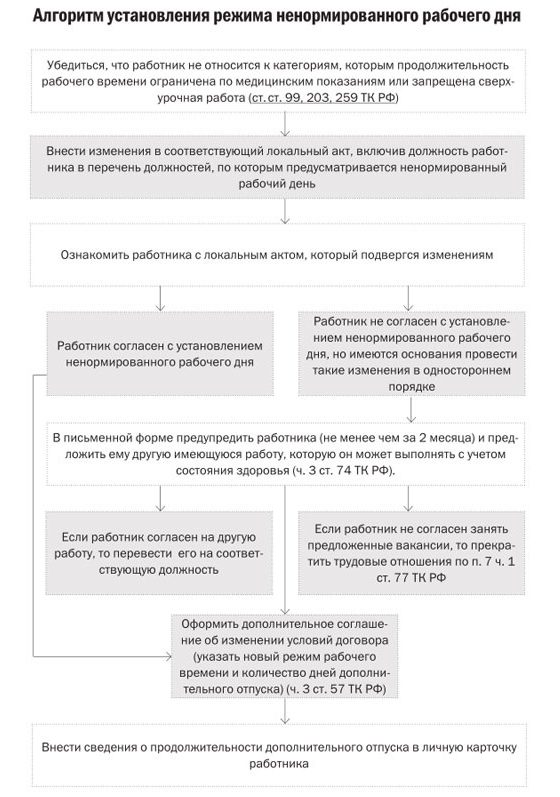An order on irregular working hours is drawn up if for some reason an employee is forced to perform his work duties overtime. At the same time, the procedure for attracting him to work beyond the established time must comply with the legislation of the Russian Federation. In order not to violate the provisions of the current labor legislation, the employer must correctly draw up an order.
- Form and sample
- Free download
- Online viewing
- Expert tested
FILES
Rules for issuing an order
An order on irregular working hours cannot be called an independent document. To issue it, the employer must first introduce a norm on work beyond the stipulated schedule in the collective agreement and/or local regulations. This rule cannot contain “general” phrases. It must indicate the following:
- Why did the employer make this decision?
- What positions does this norm affect?
- For how long can employees be required to work above normal (in hours).
This provision must be introduced after the approval of the relevant trade union organization. Only after approval of this norm can the employer issue an order.
Features of irregular working hours
Lately, employers who are having difficulties with people working long hours have been turning to us for clarification. The problem is that the latter sometimes start work later, for example, a couple of hours, believing that being late is acceptable, since in previous days there were delays at work after its formal end.
And if they were often late, they demand paid time off, indicating that they already worked too much, and significantly. Is the position of the workers legal, should the employer satisfy their demands and provide an additional day off, how is work structured during irregular working hours? You will find answers to these and other questions in the article.
According to Art. 97 of the Labor Code of the Russian Federation, the employer has the right, in the manner prescribed by the Labor Code, to involve an employee in work beyond the working hours established for him:
- for overtime work (Article 99 of the Labor Code of the Russian Federation);
- if he works on irregular working hours (Article 101 of the Labor Code of the Russian Federation).
Article 101 of the Labor Code of the Russian Federation provides a clear definition of such a working regime - this is a regime in which individual employees can, by order of the employer, if necessary, be occasionally involved in the performance of their labor functions outside the working hours established for them.
In practice, HR and accounting services often equate irregular working hours to overtime work, but without providing appropriate guarantees.
Overtime work is carried out at the initiative of the employer outside the working hours established for the employee: daily work (shift), and in the case of cumulative accounting of working hours - in excess of the normal number of working hours for the accounting period (Article 99 of the Labor Code of the Russian Federation). That is, the concept of irregular working hours in the Labor Code presupposes the appointment of a special working time regime. It is incorrect to equate this concept with overtime work.
Those who work irregular working hours, like other employees, are subject to the work schedule of the organization. For example, if a company’s working day starts at 9.00 and ends at 18.00, then an employee with irregular working hours must come to and leave work at the specified time.
The key point with irregular working hours is that the employee is involved in work beyond the established working hours occasionally, that is, not often. Although there are employers who are confident that if an employee has such a work schedule, he must sit at work from 8.00 to 00.00.
This is mistake.
Many workers believe that since they have an irregular working day, they can come to work at 10:00 or 11:00 instead of the required 9:00, or leave whenever they please. It's a delusion.
Thus, the employee filed a lawsuit to declare the disciplinary sanction illegal. He was reprimanded for being 25 minutes late for work. The employee believed that there could be no delay, since he had an irregular working day.
The court, recognizing the disciplinary sanction as legal, indicated that an irregular working day presupposes work outside the established working hours and does not provide for the release of an employee from work within the established working hours, as well as the arbitrary independent determination by the employee of the time of coming to work and leaving work, being late for work (Determination of the Moscow City Court dated 06/07/2016 No. 4g-5671/2016).
Let us say right away that the Labor Code does not limit the choice of the employer: it has the right to determine the categories of employees who can be assigned such a work regime.
The main condition is to develop and approve a list of employee positions. It is included in the collective agreement, agreement or any local regulation of the employer.
Such a list may include employee positions:
- the duration of work of which cannot be accurately calculated (company managers, business personnel and technical service workers);
- planning to complete assigned tasks at their own discretion;
- whose working day is divided into intervals of unspecified duration.
You should not include absolutely all positions on the staffing table in the list - controllers will consider this irrational. For your information
The list of positions of employees with irregular working hours must be agreed upon with the representative body of employees (if there is one).
Let's give an example of what such a list might look like.
Appendix to the Internal Labor Regulations of Zima LLC dated 10.10.2010 No. 3
- Scroll
- positions of workers with irregular working hours
- In accordance with Art. 101 of the Labor Code of the Russian Federation, due to production necessity, the following positions are included in the list of positions for workers with irregular working hours:
1. Sales department: manager, head of department.2. Administration: director, deputy director, chief accountant, secretary, driver.
We invite you to familiarize yourself with: Sample complaint against a traffic police resolution for violation of traffic rules of the Russian Federation
For working irregular hours, employees holding positions named in clauses 1 and 2 are granted an additional annual paid leave of 5 calendar days in accordance with clause 3.7 of the internal labor regulations dated 10.10.2003 No. 3.
Is it possible to establish an irregular working day for a person performing work on a part-time basis?
Yes, you can. There is no corresponding ban, and Rostrud has spoken out on this issue more than once, pointing out this possibility (see, for example, Letter dated April 19, 2010 No. 1073-6-1).
Many employers believe that if an employee is familiar with local regulations, according to which his position requires a special work schedule, this is enough to periodically involve the employee in working beyond normal limits. Moreover, most employers prefer not to formalize the recruitment in any way, making verbal orders.
However, let us say right away that it is not enough to approve a list of positions for workers with irregular working hours. Any time it is necessary for an employee to work more than he should, this should be documented.
So, if even before hiring it is known that this employee will need irregular working hours, before concluding an employment contract, the newcomer must be familiarized with local regulations that establish a list of positions with irregular working hours, indicate the type and amount of compensation for work in this mode.
Then an employment contract is drawn up, which includes a condition for working on irregular working hours, if the corresponding position is included in the list of positions of employees with irregular working hours. The inclusion of such a condition in the contract is necessary, since among the mandatory conditions of the employment contract named in Art.
57 of the Labor Code of the Russian Federation, the regime of working time and rest time is listed (if for a given employee it differs from the general rules in force for a given employer).
Thus, the employee was disciplined for refusing to continue working outside of working hours.
Recognizing the punishment as illegal, the court said that failure to comply with the verbal order of the head of the department on the urgent processing of materials for the field season cannot serve as a basis for bringing to disciplinary liability in the form of a reprimand, even if the employment contract establishes a regime of irregular working hours (Appeal ruling of the Kurgan Regional Court dated 07.08. .2014 in case No. 33-1982/2014).
After signing the employment contract, an order is issued in which in the column “Conditions of employment, nature of work” an indication of a special mode of work is made. Next, fill out a work book without indicating a special mode of work, and the employee’s personal card.
If the position was included in the said list during the work process, then employees occupying these positions must be notified in writing of the change in work mode at least two months before the establishment of the new mode. Since Art.
), the employer must have reasons to include this or that position in the list of positions with irregular working hours.
If the employee does not agree to work under the new conditions, then the employer is obliged to offer him in writing another available job (both a vacant position or work that meets his qualifications, and a vacant lower position or lower paid job), which the employee can perform taking into account his health condition.
In the absence of the specified work or refusal of the proposed employment contract is terminated in accordance with clause 7, part 1, art. 77 Labor Code of the Russian Federation.
In irregular working hours, an employee is involved in work periodically by order of the employer. However, in Art. 101 of the Labor Code of the Russian Federation does not say how such an order should be drawn up.
Based on this, we can say that the legislator also allows oral form. At the same time, we believe that oral instructions should only be used if the company has clearly established time tracking.
There are two positions regarding the fixation of overtime during irregular working hours.
Some experts believe that this is simply necessary, since according to Part 4 of Art. 91 of the Labor Code of the Russian Federation, each employer must keep accurate records of the working time worked by each employee. For this purpose, a work time sheet of the unified form T-12 or T-13 is most often used. Using magazines is also not prohibited.
If an employee is late after work, then most likely the employee entering information into the time sheet will go home earlier, and accordingly there will be no one to record the number of overtime hours. In such cases, it is advisable to issue a written order.
Contents of the order
The Order on irregular working hours must indicate:
- name of the employing organization (if the order is issued on letterhead, there is no need to duplicate the name of the employer);
- the word "order";
- number and date of the order;
- city where the document was drawn up;
- full name of the document (for example: “order on establishing an irregular working day”, “order on introducing an irregular working day”);
- reasons for introducing overtime working hours;
- Full name and position of the employee in respect of whom the order was issued;
- the period for which overtime is introduced;
- the basis for its issuance (changes in a local regulatory act or notification of the employee and his consent to work beyond the norm);
- persons authorized to sign by the employee and employer.

Making an order
On behalf of the employer, the order can be signed:
- the head of the organization acting on the basis of the constituent document;
- an authorized officer who can act on the basis of a power of attorney.
If the order is not signed by the manager, then under the transcript of the signature it is necessary to indicate on what basis another official signs the document. In this case, a copy of the document confirming the authority of the official to sign must be attached to the order.
The employees in respect of whom the order is issued sign for familiarization with the document. Usually the date of review and signature are placed at the bottom of the order. If there are more than 3 employees, it is advisable to attach a familiarization register to the order.
After signing, the order on irregular working hours is transferred to the personnel department or personnel specialist. Based on this order, in particular, time off and additional days to the main vacation are issued.
Frequent mistakes when drawing up an order
The rules on the possibility of involving an employee in overtime work are not compiled into one article of the Labor Code of the Russian Federation, which in practice causes significant difficulties.
When drawing up an order on irregular working hours, typical mistakes are:
- Signing such an order in relation to all employees unless necessary, “just in case.” A situation happens when an employer wants to hedge his bets and, just in case, draws up one general order according to which each of his employees will be delayed at work upon request. In accordance with Article 119 of the Labor Code of the Russian Federation, in case of abnormal working conditions, additional calendar leave of at least three days is granted. If the employee does not actually work overtime, the employer does not provide him with additional leave, which is a violation of labor law.
- Lack of a list of positions in which specialists will be involved in overtime work. This happens if, when issuing an order, the employer specifies not a specific position, but departments, workshops, divisions, etc. The order on irregular working hours is personalized, since personnel and accounting documents are maintained in relation to a specific employee, and not a division of the company. Also, in accordance with Article 101 of the Labor Code of the Russian Federation, the employee must be provided with working conditions that are common to all, and it is illegal to initially establish an abnormal working day for the entire workshop or department.
- Inclusion in the order of a provision on the introduction of overtime working hours only when the employee cannot cope during regular hours. In this way, the employer seeks to protect itself from providing additional leave, for example, during seasonal or holiday workload of the employee.
Sample employment contract with irregular working hours
An irregular working day in an employment contract - you will find a sample of such a document below - can be reflected if it is introduced for hired employees. It is mandatory to include information about the application of an irregular regime in an employment contract, or the law allows an alternative procedure for its introduction, you will find out by reading the article to the end.
What is an irregular day?
What document is required when establishing an irregular day - additional. agreement on long working hours or a new contract?
Worker's compensation
Contents of the sample contract
According to the Labor Code of the Russian Federation, the working day is 8 hours. But sometimes the labor regime changes periodically. What is meant by the term irregular hours in official documents in 2021?
Work in irregular hours differs significantly from the usual work schedule.
Asking is faster than reading! right now through the form (below), and one of our lawyers will call you back to provide a free consultation.
According to the law, the employer must inform the employee in advance about the peculiarities of work activity and, in particular, about the working hours.
This also applies to potential deviations from the standard work shift duration. Moreover, such nuances should be reflected in the employment contract.
In particular, a clause on non-standardization is included in the agreement. An irregular work schedule differs from the generally accepted work pattern in the form of a five- or six-day workweek, when an employee works at strictly established hours.
Important
For an employee, irregularity is expressed in the fact that he can be involved in performing functional duties beyond the duration of a regular shift.
Moreover, consent for processing is not required. There is no special form of employment contract for irregular working hours.
A document is drawn up based on a standard template. But if an employee is given an irregular working day, the employment contract must take into account the peculiarities of the labor regime.
Definitions
An explanation of the designation “irregular working hours” is discussed in Article 101 of the Labor Code of the Russian Federation.
The term defines a special working regime when individual employees, by order of management, may from time to time be involved in work activities outside the standard working day.
Article 100 of the Labor Code of the Russian Federation regulates the entry of data on irregular days into the contract. This condition is especially important since information about the working hours is included in the section of mandatory information.
This fact is confirmed by Article 57 of the Labor Code of the Russian Federation, concerning the content of the agreement. For comparison, it should be noted that the usual length of a working day is eight hours, excluding break time.
And if an employee is involved in work outside the specified period, then his activity is considered work with a special regime.
The absence of strict limits on the working day qualifies as an irregular working day.
We invite you to familiarize yourself with: Application for renunciation of inheritance: sample 2021
The law does not contain a closed list of reasons why irregular work hours may be applied.
But it is said that an employee can be involved in work outside of working hours only for objective reasons related to production necessity.

That is, the basis for activities outside the eight-hour working day must be justified. An important nuance is that production necessity is an episodic phenomenon.
If the use of irregular work becomes systematic, the employer faces administrative or financial liability.
Advice
A similar outcome is likely if the employee complains to the labor inspectorate. When the results of the audit confirm the essence of the complaint, all excess hours are recognized as overtime and are subject to additional payment.
It is also necessary to know that activities during irregular working hours require the employee to perform his immediate job responsibilities specified in the job description or contract.
If an employee is assigned to perform other functions, this is considered a violation.
The procedure for introducing a work regime with irregular hours is regulated by the Labor Code of the Russian Federation.

In particular, important provisions are contained in Article 101 of the Labor Code, dedicated to the work of workers outside the generally accepted working hours.
It is also stated here that the employer has the right to resort to extending working hours occasionally, justifying the need in the form of an oral or written order.
Moreover, this list is developed taking into account the position of a trade union or other body that protects the interests of the work collective.
An employee involved in irregular work must be familiar with the documentation regarding the establishment of a special regime, as well as the benefits and compensation provided.
This norm is determined by Part 2 of Article 57 of the Labor Code of the Russian Federation. Moreover, the working day can increase in any variation, both before the start of the standard working day and at its end.
note
Moreover, current legislation does not indicate the total duration of additional working hours.
Still looking for an answer? It's easier to ask a lawyer! Write your question using the form (below), and our specialists will quickly prepare the best options for solving your problem and call you back on the day you submit your application. It's free!
A regime with irregular working hours established for a specific employee is certainly reflected in the individual contract.
But when signing such a document, the employer should know that extended working hours are strictly prohibited for certain groups of workers (Article 92, Article 94 of the Labor Code of the Russian Federation), this applies to:
- minor workers;
- persons with disabilities (medical limitations or assigned disability group);
- workers working in hazardous/harmful conditions.
Based on the signed agreement with the presence of a condition on a special labor regime, an order of the appropriate content is issued for the enterprise.
The presence of an official document allows you to attract workers to additional work without issuing other documents. To attract someone to work outside of working hours, a verbal order from the manager is enough.
- List of positions. This document identifies positions for which it is possible to establish an irregular working day. The list is approved by a collective labor agreement or other regulatory act of the organization, taking into account the opinion of the representative body of the company. If the organization does not have a body representing the interests of employees, the list is approved by the employer. In addition, the corresponding lists can be legislated in industry documents.
- Inner order rules. Provisions on irregular working hours can be enshrined in this document, both as an annex to it and in certain of its paragraphs.
- Regulations on irregular working hours. The document sets out the conditions for registration, a list of positions, a list of compensation, as well as restrictions.
The boss needs to know about all the prohibitions and restrictions regarding the inclusion of certain persons in the list, which is stipulated under Art. 97, 99, 101 Labor Code: it is impossible to prescribe such a work schedule to persons who, according to legislative norms, are prohibited from engaging in work.
Shelf life
The employer is obliged to store all personnel documents. The order on irregular working hours applies to personnel documents, as it establishes additional obligations for persons working overtime. The Federal Law “On Archiving in the Russian Federation” of October 22, 2004 establishes the obligation to store all legally significant documents even after their validity period expires.
In the Order of the Ministry of Culture of Russia dated August 25, 2010 N 558 “On approval of the “List of standard management archival documents generated in the process of activities of state bodies, local governments and organizations, indicating storage periods”” it is determined that documents on personnel must be stored by the employer in for 75 years.
If the employer ceases its activities during this period, then all documents whose storage period has not expired are transferred to the state archives and stored there for the remaining time, and then destroyed.
General concepts
Article number 101 of the Labor Code of the Russian Federation gives the manager the right to provide employees with a certain amount of work that exceeds the existing generally accepted norm. These works must be performed during hours that are not specified in the employment contract.
Read our article about what an irregular working day is according to the Labor Code of the Russian Federation.
It is also worth noting that the legislation of the Russian Federation took care of individuals working overtime, providing them with the opportunity for additional rest.
In this case, the employee is entitled to leave not at his own expense, but paid by the employer. You can read about this in Article 119 of the Labor Code. If you have additional questions, please review articles numbered 97, 116 and 126.
An irregular working day is a specific schedule according to which individuals periodically work extra time (in excess of the established standard working hours) in order to cope with the required amount of work on time.

The main characteristics of an irregular working day include the following:
- Such a schedule can be established only for a certain category of individuals holding certain job positions.
- A slightly longer working day than existing standards should be introduced only when there is an urgent need for it.
- This mode is usually used for individuals engaged in such types of work, the performance of which cannot be accurately recorded using time.
- An irregular schedule is best suited for those employees who have expressed a desire to independently manage their working time.
- Any types of work that require seasonal performance, as well as the relevance of which depends on the time of day, and work that does not have clearly established time boundaries, are considered irregular.
We recommend paying attention to Article 57 of the Labor Code of the Russian Federation , which displays the main points and rules that require mandatory compliance when concluding an employment contract.
If a document is drawn up without taking into account the requirements of Article 57, then it will automatically not have legal force. And in an agreement that has no legal value, it makes no sense to stipulate any conditions, including those regarding irregular working hours.
You can find a sample employment contract with irregular working hours here.







